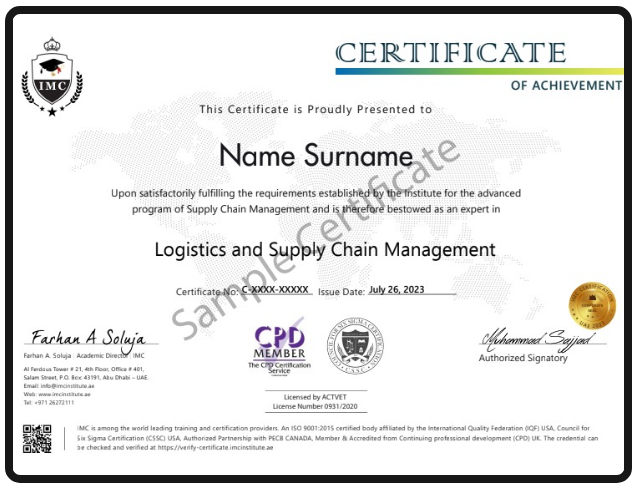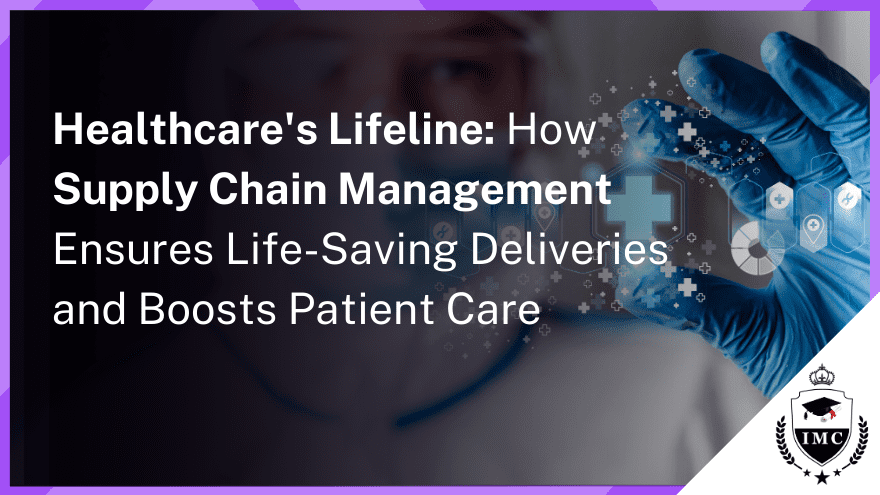Many people think of supply chain management as the efficient movement of goods from factories to store shelves. But in healthcare, a well-oiled supply chain plays a far more critical role: ensuring life-saving medications, equipment, and supplies are delivered to the right place, at the right time. At IMC Institute Supply chain management certification, we understand the gravity of effective supply chain management in healthcare. Our certification programs equip individuals with the knowledge and skills to navigate the complexities of this essential field.
The Healthcare Supply chain: A Lifeline
Imagine a hospital facing a critical shortage of blood products. A patient in need of surgery might be forced to wait, potentially jeopardizing their health. This is where a strong healthcare supply chain steps in.
Here's how supply chain management ensures life-saving deliveries in healthcare:
Inventory Management: Having the right amount of supplies on hand is crucial. Too little stock can lead to delays in treatment, while too much ties up valuable resources. Supply chain professionals use data analytics to forecast demand and optimize inventory levels.
Logistics and Distribution: Efficient transportation and warehousing are essential for getting supplies from manufacturers to hospitals and clinics. This involves managing temperature-controlled environments for medications and ensuring timely deliveries, even to remote locations.
Risk Management: Supply chains are vulnerable to disruptions, such as natural disasters or pandemics. Proactive risk management strategies, like having diverse suppliers and contingency plans, are crucial to maintaining a steady flow of critical supplies.
Beyond Efficiency: The Impact on Patient Care
A well-managed healthcare supply chain goes beyond just cost savings and efficiency. It directly impacts patient care by:
Reducing Treatment Delays: When the right supplies are readily available, procedures and treatments can happen on schedule, leading to better patient outcomes.
Ensuring Product Quality: Supply chain management includes rigorous quality control measures to ensure the safety and efficacy of medications and equipment.
Improving Patient Satisfaction: A smooth-running supply chain helps healthcare facilities operate more efficiently, ultimately leading to a better patient experience.
The Future of Healthcare Supply chains
The healthcare landscape is constantly evolving, and supply chain management must adapt. Here are some key trends:
Technology Integration: Advanced technologies like artificial intelligence and blockchain will play a bigger role in optimizing inventory management, forecasting demand, and tracking shipments.
Sustainability: Healthcare institutions are increasingly focusing on environmentally friendly practices. Sustainable supply chain management will involve sourcing materials responsibly and minimizing waste.
Data-Driven Decision Making: Data analytics will be even more crucial for optimizing every step of the supply chain, from procurement to distribution.
Equipping the Next Generation of Healthcare Supply Chain Leaders
At IMC Institute, we offer comprehensive Supply Chain Management Certification programs that equip individuals with the skills to excel in this vital field. Our programs cover a wide range of topics, including:
- Supply chain Fundamentals
- Inventory Management Strategies
- Logistics and Distribution
- Risk Management in Supply Chains
- Technology Applications in Supply Chain Management
By investing in supply chain management education, you can play a critical role in ensuring life-saving treatments reach those who need them most.
IMC Institute Supply chain management certification?
IMC Institute is a leader in providing high-quality, industry-relevant supply chain management education. Our programs are designed for busy professionals, offering both self-paced learning materials and live instructor-led training with experienced professionals. We are accredited by internationally recognized organizations like IASSC, IQF, CSSC (USA), and CPD (UK), ensuring you receive a globally recognized qualification.
By choosing IMC Institute for your Supply Chain Management Certification, you'll gain:
In-depth knowledge: Our comprehensive curriculum covers all aspects of healthcare supply chain management, equipping you with the skills to tackle complex challenges.
Practical skills: You'll learn practical strategies and techniques that can be applied immediately in your workplace.
Flexibility: Our self-paced learning options allow you to fit your studies around your busy schedule.
Expert guidance: Our experienced instructors provide personalized support and mentorship throughout your program.
Career advancement: A Supply Chain Management Certification from IMC Institute will enhance your resume and open doors to new career opportunities in the growing healthcare field.
Certification:
On successful completion of the course and course requisites, the candidate will receive Internationally recognized Supply chain management certification.

Challenges and Opportunities in Healthcare Supply Chains
While the importance of a strong healthcare supply chain is clear, there are significant challenges to overcome.
Here are some of the key hurdles:
Globalized Supply Chains: Many medical supplies are manufactured overseas, making them vulnerable to disruptions in international trade.
Rising Costs: The cost of medications and equipment is constantly increasing, putting a strain on healthcare budgets.
Counterfeit Products: The rise of counterfeit medications is a major threat to patient safety.
However, these challenges also present opportunities for innovation:
Localization: Healthcare institutions can explore sourcing more supplies from local manufacturers to reduce dependence on global supply chains.
Cost-Containment Strategies: Effective supply chain management can help negotiate better prices with suppliers and reduce waste.
Blockchain Technology: Blockchain can be used to track medications throughout the supply chain, ensuring authenticity and preventing counterfeiting.
Conclusion
The role of supply chain management in healthcare is more critical than ever. By ensuring the efficient and timely delivery of life-saving supplies, this field plays a vital role in improving patient outcomes and saving lives.
Ready to take the next step?
If you're passionate about making a difference in healthcare, consider pursuing a Supply chain certification at IMC Institute. Our programs will equip you with the knowledge and skills to navigate the complexities of this essential field and become a leader in ensuring life-saving deliveries reach those who need them most.






